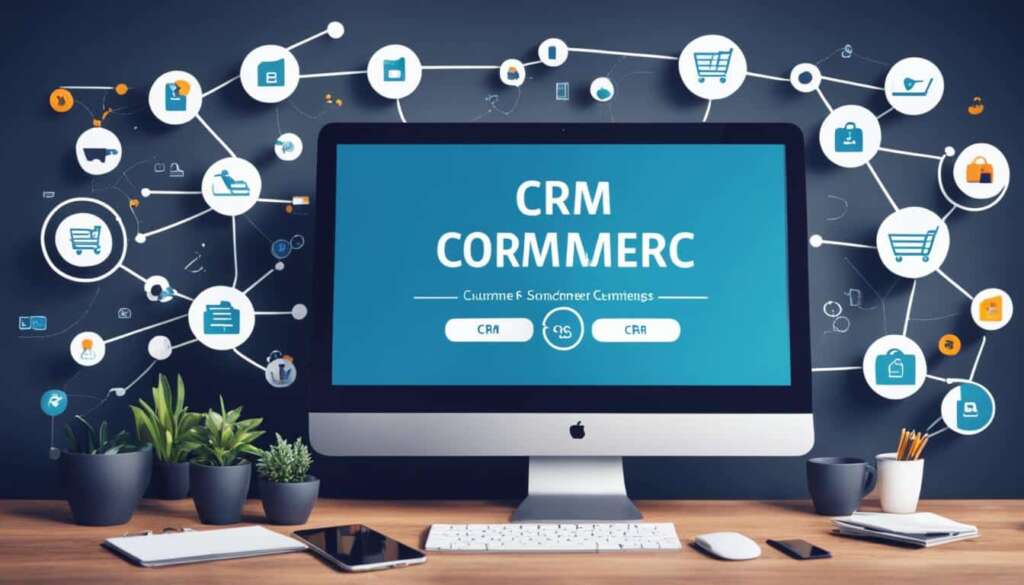Table of Contents
An e-commerce administrator is a key player in the successful operation of an online business. Their role encompasses a range of important skills and responsibilities that contribute to the smooth functioning of the e-commerce platform. In this article, we will explore the skills required, as well as the duties associated with being an e-commerce administrator.
As an e-commerce administrator, one must possess a diverse set of skills that enable them to effectively manage various aspects of the online business. These skills include:
- Strong organizational abilities to maintain an efficient product catalogue and ensure seamless customer experience
- Adaptability to keep up with the fast-paced nature of the e-commerce industry
- Attention to detail to ensure accurate pricing and plans
Additionally, a degree in IT, science, or engineering is often required for this role. This educational background provides a foundation for understanding online systems, which is a fundamental aspect of an e-commerce administrator’s job.
Now that we have explored the necessary skills, let’s delve into the specific duties that e-commerce administrators fulfill in their day-to-day work.
Responsibilities of an E-Commerce Administrator
An e-commerce administrator plays a pivotal role in managing various aspects of an online business. Their responsibilities encompass a wide range of tasks that are essential for ensuring the smooth functioning of the e-shop and company website. Let’s explore the key responsibilities that an e-commerce administrator undertakes:
1. Managing Product Catalogue
One of the primary responsibilities of an e-commerce administrator is to meticulously manage the product catalogue on the e-shop and company website. This involves ensuring accurate product listings, updating inventory levels, and organizing product categories to enhance the customer shopping experience.
2. Building and Deploying New Devices and Campaigns
An e-commerce administrator is entrusted with the crucial task of building and deploying new devices and campaigns. This includes implementing promotional strategies, creating engaging content, and optimizing campaigns to drive customer engagement and increase conversions.
3. Maintaining Online Pricing and Plans
Ensuring consistent and up-to-date pricing is another important responsibility of an e-commerce administrator. They need to monitor price changes, update promotions, and manage pricing plans to align with business goals and customer expectations.
4. Liaising with Web Content and Design Team
An e-commerce administrator collaborates closely with the web content and design team to maintain a cohesive and visually appealing website. They work together to create compelling product descriptions, captivating visuals, and user-friendly layouts that enhance the overall customer experience.
5. Representing the Online Shop in Campaign and Promotion Planning
The e-commerce administrator actively participates in campaign and promotion planning, representing the online shop’s interests and providing valuable input. They contribute to the development of marketing strategies, identify target audiences, and evaluate the effectiveness of promotional initiatives.
6. Managing E-Shop and Company Website Issues
Dealing with any issues that arise on the e-shop and company website is a crucial responsibility of an e-commerce administrator. They troubleshoot technical problems, resolve customer complaints, and ensure seamless functionality to maintain customer satisfaction and trust.
7. Providing Input on Projects Related to the Online Store
The e-commerce administrator actively participates in projects related to the online store, providing valuable insights and recommendations. They collaborate with cross-functional teams to improve website performance, enhance user experience, and drive business growth.
8. Working with the eCommerce Product Manager to Optimize Customer Experience
Collaboration with the eCommerce product manager is essential for an e-commerce administrator. Together, they analyze user data, identify pain points, and implement strategies to optimize the overall customer experience. Their ultimate goal is to foster customer loyalty and increase online sales.
“An e-commerce administrator plays a pivotal role in managing various aspects of an online business, ensuring smooth operations, and delivering an exceptional customer experience.”
| Responsibilities | Description |
|---|---|
| Managing Product Catalogue | Ensuring accurate product listings, updating inventory levels, and organizing product categories. |
| Building and Deploying New Devices and Campaigns | Implementing promotional strategies, creating engaging content, and optimizing campaigns. |
| Maintaining Online Pricing and Plans | Monitoring price changes, updating promotions, and managing pricing plans. |
| Liaising with Web Content and Design Team | Collaborating to maintain a cohesive and visually appealing website. |
| Representing the Online Shop in Campaign and Promotion Planning | Contributing to marketing strategies and evaluating promotional initiatives. |
| Managing E-Shop and Company Website Issues | Troubleshooting technical problems and resolving customer complaints. |
| Providing Input on Projects Related to the Online Store | Participating in projects to improve website performance and user experience. |
| Working with the eCommerce Product Manager to Optimize Customer Experience | Collaborating to analyze user data and enhance customer experience. |
Qualities of an E-Commerce Administrator
An e-commerce administrator plays a crucial role in the success of an online business. To excel in this position, certain qualities are essential. The following qualities contribute to their ability to maximize the potential of the online shop and drive digital conversion:
- Organization: The e-commerce administrator should possess strong organizational skills. They are responsible for managing multiple tasks, such as inventory management, product catalog updates, and campaign scheduling. Being organized ensures smooth operations and efficient workflow.
- Ability to work under pressure and meet deadlines: In the fast-paced world of e-commerce, meeting deadlines and working under pressure are crucial. The administrator should thrive in high-pressure situations and be able to deliver results within tight timelines.
- Forward-thinking and ability to make improvement recommendations: A successful e-commerce administrator is proactive and constantly seeks opportunities to enhance the online shopping experience. They analyze market trends, identify areas of improvement, and recommend strategies for growth.
- Strong interpersonal skills: Collaboration is key in an e-commerce environment. An administrator should possess excellent communication and interpersonal skills to work with various stakeholders, including marketing teams, web developers, customer support, and suppliers.
- Excellent attention to detail: Precise attention to detail is crucial in managing product listings, pricing information, and promotional campaigns. Even the smallest error can result in customer dissatisfaction or loss of revenue. An e-commerce administrator should meticulously review and double-check all website content.
These qualities contribute to the success of an e-commerce administrator and enable them to drive growth and success in the online business.
Education and Experience of an E-Commerce Administrator
When it comes to the role of an e-commerce administrator, a comprehensive education combined with relevant experience is key. Generally, a degree in IT, science, or engineering is typically required. However, having a strong understanding of online systems can greatly benefit aspiring e-commerce administrators.
While theoretical knowledge is valuable, practical accomplishments take precedence in this field. Experience as an e-commerce administrator or in a similar role is highly desired. This hands-on experience allows candidates to develop the necessary skills and expertise to excel in the role.
Working as an e-commerce administrator can be demanding and fast-paced. The ability to work in high-stress situations, handle multiple projects simultaneously, and navigate complex challenges is essential. Excellent problem-solving skills are a must, as administrators often encounter technical issues and must find efficient solutions to ensure the smooth functioning of the online business.
Overall, a combination of education and experience equips e-commerce administrators with the knowledge, skills, and adaptability necessary to thrive in this rapidly evolving digital landscape.
“The backbone of any successful e-commerce operation lies in the expertise and capabilities of the e-commerce administrator.” – Mark Johnson, E-commerce Consultant
Every e-commerce administrator brings unique experiences and insights to the table, contributing to the growth and success of the online business they support.

| Education | Experience |
|---|---|
| A degree in IT, science, or engineering | Experience as an e-commerce administrator or in a similar role |
| Understanding of online systems | Working in high-stress situations |
| Handling multiple projects simultaneously | |
| Excellent problem-solving skills |
Duties of an E-Commerce Office Administrator
An e-commerce office administrator plays a crucial role in ensuring the smooth operation of the office and supporting the overall functioning of the e-commerce business. They are responsible for a variety of duties that contribute to the efficient running of the office and the success of the online business.
Some of the key duties of an e-commerce office administrator include:
- Answering phone calls and providing excellent customer service to clients who may have inquiries or require assistance.
- Receiving and sorting mail, ensuring prompt and accurate distribution to the appropriate recipients within the organization.
- Managing finances, which may involve invoicing, tracking expenses, and working closely with the finance team to ensure accurate budget management.
- Running errands and carrying out tasks outside of the office, such as picking up supplies or documents as needed.
- Paying bills and handling financial transactions, ensuring timely and accurate payments to vendors and suppliers.
- Organizing office systems, including maintaining paper and electronic files, databases, and other records necessary for smooth operations.
- Arranging travel and accommodation for staff members, ensuring all travel arrangements are made in accordance with company policies.
- Corresponding on behalf of the manager, drafting emails, letters, and other communications to clients, suppliers, and stakeholders.
- Carrying out research on various topics and compiling information into reports or presentations.
- Producing documents and reports, including generating sales and financial reports, data analysis, and performance metrics.
- Organizing and attending meetings, including scheduling, preparing agendas, taking minutes, and ensuring follow-up on action items.
- Liaising with clients, suppliers, and other staff members to ensure effective communication and coordination.
Proficiency in Microsoft Office applications, including Word, Excel, and Outlook, is essential for an e-commerce office administrator. Excellent organizational skills, attention to detail, and the ability to prioritize tasks are also crucial to effectively manage the diverse range of responsibilities in this role.
Here is an image showcasing the daily duties of an e-commerce office administrator:
Responsibilities of an E-Commerce System Administrator
An e-commerce system administrator is a key role in ensuring the smooth operation of an online business. They have a range of responsibilities that contribute to the efficient functioning and optimization of the e-commerce system. Their duties include:
- Providing senior oversight and expertise in the overall ecosystem supporting the online environment.
- Resolving issues and recommending improvements to enhance the performance and functionality of the e-commerce system.
- Developing recommendations and strategies to optimize the online platform and drive business growth.
- Collaborating with other departments, such as IT, marketing, and customer service, to address and resolve system issues.
- Developing and implementing IT strategies that align with the business’s goals and objectives.
- Setting up and configuring systems to ensure smooth operation and integration of various components.
- Troubleshooting hardware and software issues to maintain system efficiency and minimize downtime.
- Managing complex information systems and IT infrastructure to support the online business operations effectively.
An e-commerce system administrator plays a critical role in maintaining the stability, security, and functionality of the e-commerce platform. They work closely with different teams and stakeholders to ensure seamless operations and a positive user experience for customers. Their expertise and technical knowledge are essential in overcoming challenges and driving continuous improvement within the e-commerce system.

As an e-commerce system administrator, it is vital to stay updated with the latest industry trends and technologies to effectively manage and optimize the e-commerce system. This role requires a combination of technical skills, problem-solving abilities, and a customer-centric mindset. By fulfilling their responsibilities, an e-commerce system administrator contributes to the success and growth of the online business.
Conclusion
The role of an e-commerce administrator is vital in ensuring the smooth functioning of an online business. These professionals play a significant role in driving digital conversion and maximizing the potential of the online shop. From managing product catalogues to optimizing the customer experience, e-commerce administrators are equipped with the technical knowledge, organizational skills, and attention to detail needed for success in this dynamic role.
In today’s digital marketplace, e-commerce continues to gain importance, resulting in a rising demand for skilled e-commerce administrators. Businesses recognize the value of these professionals in managing online operations and delivering a seamless customer experience. As online shopping becomes increasingly prevalent, e-commerce administrators are essential in maintaining the competitive edge of businesses and driving growth.
As technology evolves, e-commerce administrators must stay abreast of new trends and tools to effectively navigate the ever-changing digital landscape. They need to continuously adapt and optimize online systems to ensure optimal performance, security, and customer satisfaction. The role of an e-commerce administrator is not only crucial but also dynamic, presenting new opportunities for growth and innovation.
FAQ
What is the role of an e-commerce administrator?
An e-commerce administrator plays a crucial role in maintaining the smooth operations of an online business. They are responsible for managing the product catalogue, building and deploying new devices and campaigns, maintaining online pricing and plans, and ensuring a seamless customer experience.
What are the key responsibilities of an e-commerce administrator?
The key responsibilities of an e-commerce administrator include managing the product catalogue on the e-shop and company website, building and deploying new devices and campaigns, maintaining online pricing and plans, liaising with web content and design team, representing the online shop in campaign and promotion planning, and managing any issues that arise on the e-shop and company website.
What qualities should an e-commerce administrator possess?
An e-commerce administrator should possess certain qualities to excel in their role. These qualities include being organized, able to work under pressure and meet deadlines, forward-thinking and able to make improvement recommendations, having strong interpersonal skills to collaborate with different areas within the business, and having excellent attention to detail.
What education and experience are required for an e-commerce administrator?
To qualify for the role of an e-commerce administrator, a degree in IT, science, or engineering is typically required. Additionally, having an understanding of online systems is beneficial. Experience as an e-commerce administrator or in a similar role is highly desired.
What are the duties of an e-commerce office administrator?
The duties of an e-commerce office administrator include answering phone calls, receiving mail, managing finances, running errands, paying bills, organizing office systems, arranging travel, corresponding on behalf of the manager, carrying out research, producing documents and reports, and organizing and attending meetings.
What are the responsibilities of an e-commerce system administrator?
The responsibilities of an e-commerce system administrator include providing senior oversight and expertise in the overall ecosystem supporting the online environment, resolving issues and recommending improvements, developing recommendations and strategies, and collaborating with other departments to resolve system issues.
Why is the role of an e-commerce administrator important?
The role of an e-commerce administrator is vital in ensuring the smooth functioning of an online business. From managing product catalogues to optimizing the customer experience, these professionals play a significant role in driving digital conversion and maximizing the potential of the online shop.













